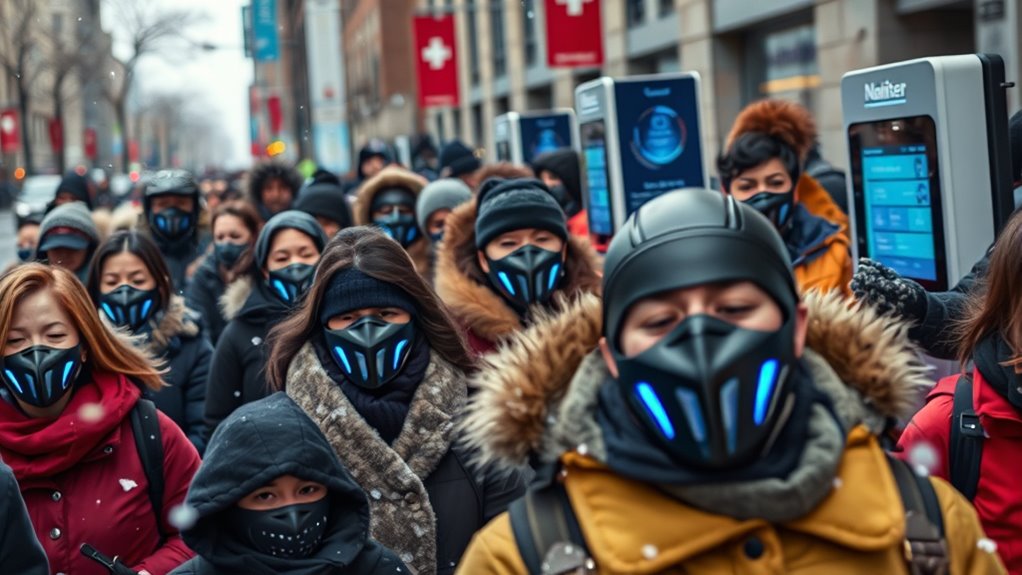As cooler weather arrives, you should expect the 2025-26 flu season to start, making early vaccination and good hygiene essential. Getting vaccinated early helps protect you and those around you from severe illness, while practicing handwashing, covering coughs, and staying home when sick reduce your risk of catching or spreading the flu. Staying informed about local vaccination clinics and health updates can further help you stay safe throughout the season—keep going to learn more.
Key Takeaways
- Early vaccination and good hygiene practices are essential to reduce illness during Flu Season 2025-26.
- The season begins with cooler weather and falling leaves, catching many unprepared.
- Public health efforts focus on vaccination, hygiene, and staying informed about circulating strains.
- Vulnerable groups should prioritize vaccination and stay vigilant for health advisories.
- Combining vaccination with healthy habits minimizes disruptions and health risks during the season.

Are you prepared for flu season 2025-26? As the leaves start to fall and temperatures drop, it’s essential to understand what you can expect this year and how to stay protected. Flu season can catch many off guard, but being proactive makes a significant difference. One of the most effective ways to guard yourself and others is by getting vaccinated early in the season. Vaccine effectiveness plays a crucial role in reducing illness severity, hospitalizations, and the spread of the virus. This year, health authorities are emphasizing the importance of vaccination as part of broader public health strategies aimed at minimizing the impact of influenza. These strategies include not just encouraging vaccination but also promoting good hygiene, staying home when sick, and maintaining clean environments.
Getting vaccinated early and practicing good hygiene are key to staying protected this flu season.
You should know that vaccine effectiveness can vary from year to year, depending on how well the vaccine matches circulating strains. However, even if the protection isn’t perfect, getting vaccinated still significantly lowers your chances of severe illness. Public health strategies are designed to maximize this protective benefit by ensuring widespread vaccination coverage, especially among vulnerable populations like the elderly, young children, and those with underlying health conditions. These strategies also involve timely communication campaigns to dispel myths about the flu shot and motivate more people to get vaccinated early in the season. By doing so, the community’s overall immunity improves, reducing the likelihood of outbreaks and easing the burden on healthcare systems. Monitoring mammography guidelines can also be a valuable part of health awareness, especially for those with risk factors that may influence their overall health during flu season.
As you prepare, it’s vital to stay informed about local vaccination clinics and availability. Many health departments will organize free or low-cost vaccination events, so keep an eye out for announcements in your area. Besides vaccination, practicing good hygiene is equally important—regular handwashing, avoiding close contact with sick individuals, and covering your mouth when coughing or sneezing help curb the virus’s spread. If you’re feeling unwell, stay home to prevent infecting others. Maintaining a healthy lifestyle, including adequate sleep, balanced nutrition, and staying active, can also bolster your immune system.
Ultimately, flu season 2025-26 might bring challenges, but with a clear understanding of vaccine effectiveness and adherence to public health strategies, you can significantly reduce your risk. Being prepared means not only getting vaccinated but also staying vigilant and practicing good health habits. The more proactive you are, the better your chances of steering through this flu season safely and minimizing disruptions to your daily life.
Frequently Asked Questions
Will New Flu Strains Emerge This Season?
Yes, new flu strains are likely to emerge this season due to viral mutation, which is common with influenza viruses. These mutations can sometimes increase the virus’s pandemic potential, making it more contagious or resistant to vaccines. To stay protected, get your flu shot, practice good hygiene, and stay informed about updates from health authorities. Being proactive helps you reduce the risk of illness and helps monitor evolving strains.
How Effective Will the Flu Vaccine Be This Year?
You’ll probably find the flu vaccine this year as reliable as your Wi-Fi during a storm—predictably unpredictable. Vaccine development experts make efficacy predictions with the precision of weather forecasts, so expect some variation. Still, getting vaccinated boosts your odds of avoiding severe illness. While no miracle cure, it’s your best shot to stay ahead of those pesky flu strains. So, roll up your sleeve; it’s worth the gamble.
Are There Any New Treatment Options for Flu?
Yes, new treatment options are emerging this year. Besides traditional antiviral medications like oseltamivir and zanamivir, researchers are exploring experimental therapies that could offer faster or more effective relief. You might see these options in clinical trials soon, but always consult your healthcare provider before trying new treatments. Staying updated on approved antiviral medications guarantees you get the most effective and safe options for managing flu symptoms.
How Can I Protect Vulnerable Populations During Flu Season?
Think of yourself as a shield guarding vulnerable populations this flu season. You can do this through community outreach, spreading awareness and providing accessible vaccination clinics. Make vaccination easy to reach—like opening a door rather than knocking on it—and encourage everyone, especially at-risk groups, to get vaccinated. Your proactive steps can create a safety net, protecting those most vulnerable from severe illness and helping your community stay healthy together.
What Are the Long-Term Health Impacts of Severe Flu?
Severe flu can lead to long-term health consequences, especially if complications arise. You might experience chronic respiratory issues like ongoing cough, wheezing, or difficulty breathing. In some cases, severe flu can worsen existing conditions such as asthma or COPD. Protect yourself by getting vaccinated, practicing good hygiene, and seeking prompt medical attention if symptoms worsen. Staying proactive helps minimize these long-term health impacts and supports your overall recovery.
Conclusion
As you gear up for flu season 2025-26, remember that staying informed and prepared is your best shield. Think of it like tending a garden—you need to nurture your defenses with vaccines, good hygiene, and healthy habits to keep those pesky flu germs at bay. By taking proactive steps, you can sail smoothly through the season, turning potential chaos into a calm lake rather than a storm. Stay vigilant and protect yourself and your loved ones.










